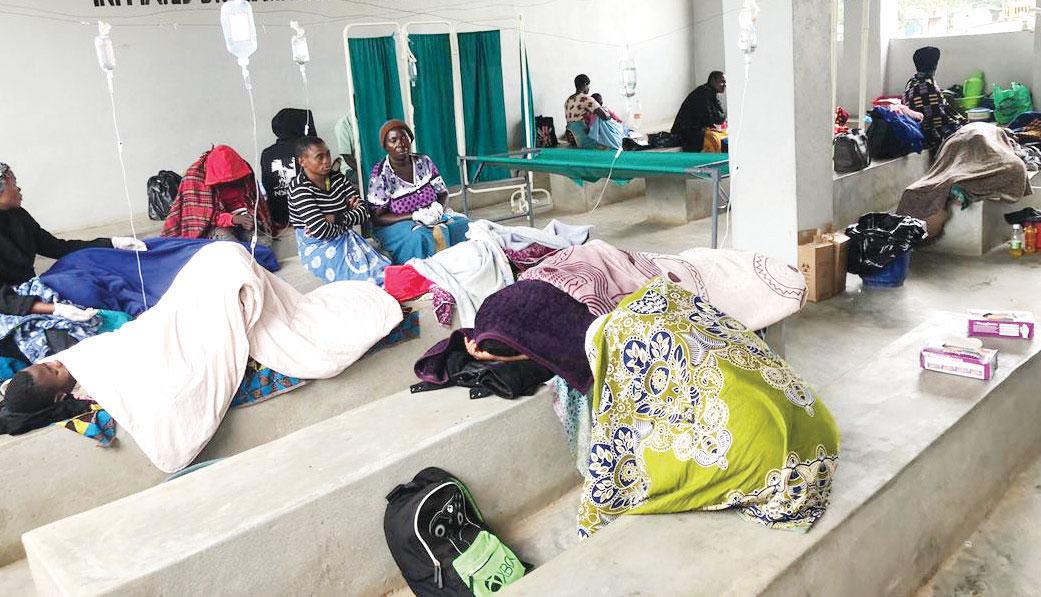Africa-Press – Malawi. Cholera continues to claim more lives in what some are describing as Malawi’s worst cholera outbreak in a decade, with recent statistics showing 19,629 confirmed cases and 661 deaths as of Thursday, January 5.
Surprisingly, this is happening at a time when several organisations, with donor support, have been implementing projects in the country meant to end open defecation, provide clean water and achieve sanitation, especially in villages.
An update from the Public Health Institute of Malawi (PHIM) affirms that despite some improvements in the provision of safe water and sanitation, cholera still remains a challenge in Malawi.
Statistics show that from 1998 to 2021, Malawi experienced cholera outbreaks almost every year, with the worst episodes in 1998-99, 2001-02 and 2017- 18.
According to the PHIM records, no case and death were recorded in 2012-2013 and 2013-2014, while 693 cases and 11 deaths were recorded in 2014-2015. In 2017-2018, 939 cases were recorded and 32 deaths while between 2019 and 2020, three cases and no death were recorded.
In the 2020-2021 season, the country recorded two cholera cases with no death, reads statistics from PHIM. Adamson Muula, an epidemiology expert and Malawi Medical Journal Editor-in-Chief said in his recent write-up in the publication that unlike Covid-19, cholera affects the very poor.
He said much of the population, especially those who have little or no access to potable water, toilets or hygienic latrines and access to food prepared and stored in hygienic ways are at great risk of catching cholera.
“Not all of us are at risk of cholera. People who have functioning water closets, potable water from taps in homes and those who fortify themselves by not eating at questionable places are basically not at risk. Such a disparity in risk has contributed to the spread of the disease. Cholera affects people ‘without names’.
“People who are not served by the municipal water supply system. People who defecate in bushes and other open spaces, drink from open water sources (lake, unprotected wells) and those who live in communities where the different water companies can fail to provide tap water for days on end. Such a disease becomes difficult to control as the bourgeois feel unconcerned,” he said.
Muula said cholera will disappear once the country is committed to meeting the Sustainable Development Goals (SDG) such as SDG 3 (Good health and Wellbeing), SDG 6 (Clean water and Sanitation), and SDG 10 (Reduced Inequalities).
Addressing journalists in Lilongwe on Tuesday, Minister of Health who is also the co-chairperson of the Presidential Task Force on Covid-19 and Cholera, Khumbize Kandodo Chiponda, said government is doing its best to deal with the outbreak. During the briefing, Chiponda read out measures that government intends to implement.
In urban areas, the measures include providing free water connection giving priority to hotspot areas, water trucking using bowsers, chlorine distribution, suspension of in areas in all public kiosks and open all kiosks with accumulated bills, water quality assessment in targeted areas and expansion of pipe networks targeting low income and slums in Lilongwe and Blantyre cities.
In rural areas, the measures include rehabilitation of boreholes, hygiene promotion, chlorine distribution and water quality assessment. Health rights activists Maziko Matemba acknowledged that the current outbreak has been prolonged in an unprecedented manner and has since called on researchers to find out more.
“There could be a number reasons for this and our researchers need to find out. They have to find out if this is a new strain or an old strain that is not well managed in terms of how it is spreading. If you check at the moment how it is spreading from the host and how it is spread only researchers can establish that.
“There have been seven strains of cholera since the 1800s so the last strain was identified in 1961 which is still causing problems up to now. The question would be: Is it still the same or the strain has changed its characteristics and now is behaving differently?” he said. In May last year, Malawi conducted a nationwide cholera vaccination campaign and it has been on going.
For More News And Analysis About Malawi Follow Africa-Press






